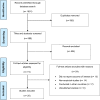Prevalence and Determinants of COVID-19 Vaccine Hesitancy Among the Ethiopian Population: A Systematic Review
- PMID: 35937966
- PMCID: PMC9346414
- DOI: 10.2147/RMHP.S368057
Prevalence and Determinants of COVID-19 Vaccine Hesitancy Among the Ethiopian Population: A Systematic Review
Abstract
Introduction: Although vaccination is the most effective way to end the COVID-19 pandemic, there are growing concerns that vaccine hesitancy may undermine its effectiveness. In Ethiopia, vaccine hesitancy forms a major challenge to the uptake of COVID-19 vaccines. This systematic review examined the prevalence and determinants of the COVID-19 vaccine hesitancy among the Ethiopian population.
Methods: A systematic search of articles was conducted in PubMed, EBSCO, Google Scholar, and Semantic Scholar. Studies that evaluated the prevalence and determinants of COVID-19 vaccine hesitancy in Ethiopia were included. The identified determinants of COVID-19 vaccine hesitancy were analyzed based on the frequency of occurrence in the included studies.
Results: The overall COVID-19 vaccine hesitancy level in the Ethiopian population ranged from 14.1% to 68.7%. The high COVID-19 vaccine hesitancy rate observed in this study was due to contextual factors, individual factors, and vaccine-specific factors. Young age, female sex, living in rural areas, lack of adequate information, and lower education are the most common contextual determinants of the COVID-19 vaccine hesitancy. Lack of awareness about the COVID-19 vaccine, low risk of COVID-19, poor adherence to COVID-19 prevention strategies, and negative attitude towards the COVID-19 vaccine are the most frequently reported personal factors. Common vaccine-specific determinants of COVID-19 vaccine hesitation are the side effects of the vaccine and doubts about its effectiveness of the vaccine.
Conclusion: Our review showed that COVID-19 vaccine hesitancy remains highly prevalent and varied across regions of Ethiopia, with a wide variety of factors associated with it. Potential interventions on the benefits of vaccination and the adverse effects of vaccine rejection are crucial to enhance COVID-19 vaccine uptake among the Ethiopian population.
Keywords: COVID-19; Ethiopia; acceptance; hesitancy; systematic review; vaccine.
© 2022 Yehualashet et al.
Conflict of interest statement
The authors declare no conflicts of interest in this work.
Figures
Similar articles
-
COVID-19 vaccine hesitancy: A Systematic review of cognitive determinants.Health Promot Perspect. 2023 Apr 30;13(1):21-35. doi: 10.34172/hpp.2023.03. eCollection 2023. Health Promot Perspect. 2023. PMID: 37309435 Free PMC article.
-
Potential Determinants Contributing to COVID-19 Vaccine Acceptance and Hesitancy in Taiwan: Rapid Qualitative Mixed Methods Study.JMIR Form Res. 2023 Sep 12;7:e41364. doi: 10.2196/41364. JMIR Form Res. 2023. PMID: 37698904 Free PMC article.
-
COVID-19 Vaccine Hesitancy-A Scoping Review of Literature in High-Income Countries.Vaccines (Basel). 2021 Aug 13;9(8):900. doi: 10.3390/vaccines9080900. Vaccines (Basel). 2021. PMID: 34452026 Free PMC article.
-
Prevalence and determinants to COVID-19 vaccine hesitancy among people living with HIV in Bench Sheko zone, Southwest Ethiopia: A multi-center study.Heliyon. 2024 Mar 9;10(6):e27901. doi: 10.1016/j.heliyon.2024.e27901. eCollection 2024 Mar 30. Heliyon. 2024. PMID: 38496901 Free PMC article.
-
COVID-19 vaccine hesitancy in Ethiopia in 2021: a multicenter cross-sectional study.IJID Reg. 2023 Mar;6:120-124. doi: 10.1016/j.ijregi.2022.11.006. Epub 2022 Dec 8. IJID Reg. 2023. PMID: 36510492 Free PMC article.
Cited by
-
Determinants of Covid-19 vaccine uptake among the elderly aged 58 years and above in Kericho County, Kenya: Institution based cross sectional survey.PLOS Glob Public Health. 2023 Sep 12;3(9):e0001562. doi: 10.1371/journal.pgph.0001562. eCollection 2023. PLOS Glob Public Health. 2023. PMID: 37698989 Free PMC article.
-
Reducing Barriers to COVID-19 Vaccination Uptake: Community Ideas from Urban and Rural Kenya.Int J Environ Res Public Health. 2023 Nov 22;20(23):7093. doi: 10.3390/ijerph20237093. Int J Environ Res Public Health. 2023. PMID: 38063523 Free PMC article.
-
COVID-19 vaccine hesitancy: assessing the prevalence, predictors, and effectiveness of a community pharmacy based counseling intervention.BMC Public Health. 2024 Jan 6;24(1):111. doi: 10.1186/s12889-023-17532-4. BMC Public Health. 2024. PMID: 38184570 Free PMC article.
-
Achieving COVID-19 herd immunity in Ethiopia.Public Health Chall. 2023 Jun 19;2(2):e99. doi: 10.1002/puh2.99. eCollection 2023 Jun. Public Health Chall. 2023. PMID: 40495867 Free PMC article.
-
Willingness to Accept COVID-19 Vaccine and Associated Factors Among Adult Household Members in Dire Dawa City Administration, East Ethiopia.Patient Prefer Adherence. 2022 Nov 1;16:2977-2988. doi: 10.2147/PPA.S380393. eCollection 2022. Patient Prefer Adherence. 2022. Retraction in: Patient Prefer Adherence. 2023 Feb 08;17:349-350. doi: 10.2147/PPA.S405526. PMID: 36345291 Free PMC article. Retracted.
References
-
- WHO director-general’s opening remarks at the media briefing on COVID-19-11 March 2020. Available from: https://www.who.int/directorgeneral/speeches/detail/who-director-general.... Accessed July 25, 2022.
-
- World Health Organization. Coronavirus disease (COVID-19): vaccines safety; 2021. Available from: https://www.who.int/news-room/q-a-detail/coronavirus-disease-(covid-19)-.... Accessed July 25, 2022.
-
- Centers for Disease Control and Prevention. Vaccine safety and monitoring; 2021. Available from: https://www.cdc.gov/coronavirus/2019-ncov/vaccines/safety.html. Accessed July 25, 2022.
Publication types
LinkOut - more resources
Full Text Sources


